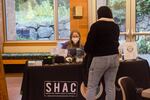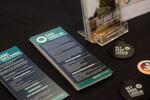On the Portland State University campus last week, things looked a lot like they did before the pandemic. Students walked through the downtown Southwest Park blocks bundled up against the cold final weeks of fall term. Inside buildings, people took their final exams or were studying for them.
Although the campus and classrooms may resemble life before the arrival of COVID-19, students and administrators say it doesn’t really feel that way. Many students are still impacted by the pandemic when it comes to social and emotional wellbeing and mental health.
At a vaccination event in the Native American Student and Community Center on PSU’s campus, Grace Johnson hands out free stickers, condoms and pamphlets about the university’s counseling services.
Johnson is with PSU’s Wellness & Health Action Team — or WHAT — a group of undergraduate students that works with the Center for Student Health and Counseling as peer mentors and educators.
“I enjoy connecting people with the counseling services,” Johnson said. “I always feel happy that I’m at least getting someone put in the right direction, because when I was seeking out counseling a few years ago, the hardest part about it was just setting up the appointment.”

Grace Johnson, left, talks with a student about what PSU's Center for Student Health and Counseling offers at a tabling event on the university's campus on Wednesday, Dec. 7, 2022.
Meerah Powell / OPB
Johnson started going to counseling in high school. She said that experience made her feel more comfortable accessing PSU’s counseling services when she really needed them during her sophomore year, when the pandemic pushed classes and campus operations from in-person to online.
She says her own personal experience accessing mental health resources aids her in encouraging other students to do the same.
“It helps me be more empathetic and understanding,” Johnson said. “I think with lived experiences comes more nuanced understanding and less black and white thinking … It adds a layer of understanding and comfort to students.”
According to PSU’s Center for Student Health and Counseling, more students have been scheduling counseling appointments as the pandemic has gone on.
“This past academic year we have had an increase in the number of unique students who accessed counseling services,” Marcy Hunt, director of the SHAC said, “and I expect this number to continue to increase for the current academic year.”
Hunt says the student health center is working hard to hire more therapists to meet that increased need.
Colleges and universities across the country are also seeing increased student need for mental health services.
According to a national Healthy Minds Study, which surveyed roughly 350,000 students across the country, in the 2020-2021 school year, more than 60% of students met the criteria for one or more mental health problems. That’s a nearly 50% increase from 2013.
Hunt said students at PSU are accessing counseling to address concerns like anxiety, depression, problems with relationships and difficulty with concentrating on academic work.
The hustle and bustle is back, but some students still feel disconnected
University administrators OPB talked with throughout the Portland region have noted a sense of students feeling disconnected on campus, even as pandemic-related restrictions are lifted and in-person events resume.
That’s what PSU student Johnson is seeing.
Even though the number of students seeking counseling has increased, Johnson said she and her fellow peer mentors have had fewer students coming up to WHAT’s table at events around campus this year.
Johnson said she’s not exactly sure why that is, but she suspects students are feeling disconnected.
“People are kind of coming back to school or finishing up and … they’re just like, ‘Ok, I’m just trying to go to class,’” she said. “‘I’m not trying to do an activity with this random girl from the health center.’”
Johnson said students seem to be less interested in being involved in campus activities than before the pandemic. She relates to that. She’s in her last year at PSU, finishing a degree in public health.

Grace Johnson, 22, is a senior at PSU. She works with the Wellness & Health Action Team as a peer mentor and educator.
Meerah Powell / OPB
“Honestly, I had a hard time finding connections in college and having a solid friend group … and I think that had to do with the fact that I was very isolated during COVID and during these kind of formative years of college,” Johnson said. “And then now, like this year and last year, I’m just kind of like, ‘ok, well I’m just grinding to get my degree at this point’. I’m not having the time or necessarily the need to go out to every orientation event.”
That’s not the case for every student. According to Oregon students and the university administrators OPB contacted, there are still many people who are excited to get back to in-person events.
But, it’s clear the pandemic has had a lasting effect on many students, as evidenced by more students accessing counseling services — and fewer students living on-campus at Portland State.
In fall 2019, before the pandemic, more than 1,900 students lived on campus at PSU. That number dropped by more than half in the first year of the pandemic to 838 students living on-campus in fall 2020.
That number has bumped back up, but not to where it was before the pandemic. In fall 2021, there were 1,641 students in on-campus housing. This fall that number has dipped slightly to 1,619.
Mental health for the next generation: ‘We don’t know if everything’s going to turn out fine’
Some administrators say social anxiety has been especially prevalent for students who spent the last part of high school online due to the pandemic. They missed out on in-person milestones like prom and graduation, and may have started college online, as well.
Johnson says she sees a difference among the younger people in her life.
“I’m 22. I’m graduating in Spring 2023, and people my age are kind of the last class of people who had any sort of snippet of college before COVID,” Johnson said.
“There’s just been such a shift in socialization, the way that people socialize,” she said. “It’s so hard to get Gen Z ramped up about being happy or being like, ‘Oh, everything will turn out fine,” because we just like literally don’t know if everything’s going to turn out fine.”
Johnson said talking about mental health and mental illness has become more normalized during the pandemic, and there are pros and cons to that.
“The normalization of mental illness has become such a great conversation, but because it’s so talked about, it’s almost become an identity for people,” Johnson said. “I’ve had moments in my mental health journey where my depression was such a part of my identity that when I started feeling better, I wanted to go back to my depression pit, because I didn’t know anything better.”
Hunt, director of the Center for Student Health and Counseling, said that’s a common challenge for students dealing with mental health concerns — not only depression, but conditions like anxiety, ADHD and eating disorders.

The Wellness & Health Action Team's table features information for students about health services and offerings around campus, including counseling.
Meerah Powell / OPB
“The good news is that treatment (therapy/medication management) works by increasing a person’s ability to manage or cope with depressive symptoms so they have more capacity to connect or reconnect with those other parts of their core identity,” Hunt said.
Johnson said WHAT explores the intricacies of mental illness and health in its interactions with students. Along with tabling events, the team strives to reach students in a variety of ways, such as through workshops, a podcast and social media posts dedicated to student wellness.
“We want to be able to communicate with students on a peer-to-peer basis, because for a lot of people, especially when it comes to help, it can be intimidating going up to a professional or someone that’s older than you and asking for advice,” Johnson said.
Johnson said she and her coworkers hosted a workshop recently about resiliency. They emphasized looking for ways to reframe stressful situations in a positive way, like for example, failing a test or missing a big assignment deadline.
“It’s going to suck in the moment,” Johnson said. “But you also have to learn — you have to have skills to accept things and move on.”
She’s hopeful students will gain those skills by accessing help when they need it.
“I don’t know if it will get better, but I hope it does,” Johnson said. “I hope it does for people my age and people younger than me. I see the light for us.”
